No paywall, ever. Instead, we rely on reader support to keep our stories accessible to everyone. Please donate what you can. Every dollar counts.
One way to acknowledge teachers' vital role is to stay informed about education. Consider supporting your favorite all-education news outlet for less than $3 a week.
The Hechinger Report
Covering Innovation & Inequality in Education


Another problem with shifting education online: cheating
Share this:
- Click to share on LinkedIn (Opens in new window)
- Click to share on Pinterest (Opens in new window)
- Click to share on Reddit (Opens in new window)
- Click to share on WhatsApp (Opens in new window)
- Click to email a link to a friend (Opens in new window)
The Hechinger Report is a national nonprofit newsroom that reports on one topic: education. Sign up for our weekly newsletters to get stories like this delivered directly to your inbox. Consider supporting our stories and becoming a member today.
When universities went online in response to Covid-19, so did the tests their students took. But one of the people who logged on to take an exam in a pre-med chemistry class at a well-known mid-Atlantic university turned out not to be a student at all.

He was a plant. An imposter. A paid ringer.
Proctors — remote monitors some schools have hired to watch test-takers through their webcams — discovered by reviewing video recordings that this same person had taken tests for at least a dozen different students enrolled at seven universities across the country. The camera caught a spreadsheet tacked to the wall of his workspace with student names, course schedules, remote login information and passwords for websites that could feed him answers.
“We can only imagine what the rate of inappropriate testing activity is when no one is watching.” Scott McFarland, CEO, ProctorU
But he was in Qatar, beyond the reach of any attempts to hold him accountable, according to proctors familiar with the situation. They could not say what happened to the students who allegedly hired him.
It was a dramatic case, but far from unique. Universal online testing has created a documented increase in cheating, often because universities, colleges and testing companies were unprepared for the scale of the transformation or unable or unwilling to pay for safeguards, according to faculty and testing experts.
Even with trained proctors watching test-takers and checking their IDs, cheating is up. Before Covid-19 forced millions of students online, one of the companies that provides that service, ProctorU, caught people cheating on fewer than 1 percent of the 340,000 exams it administered from January through March. During the height of remote testing, the company says, the number of exams it supervised jumped to 1.3 million from April through June, and the cheating rate rose above 8 percent.
“We can only imagine what the rate of inappropriate testing activity is when no one is watching,” said Scott McFarland, CEO of ProctorU.
Related: As students fill summer courses, many ask: Why aren’t all colleges open in the summers?
And for most online test-takers, no one has been watching. One reason is that, as demand for online testing spiked, proctoring capacity was overwhelmed. One company, Examity, suspended its live proctoring services during the demand surge when its 1,000 proctors in India were locked down to curb the spread of the coronavirus there.

Ninety-three percent of instructors think students are more likely to cheat online than in person , according to a survey conducted in May by the publishing and digital education company Wiley. Only a third said they were using some type of proctoring to prevent it. Many colleges and universities moved ahead with online testing without supervision to save money. Others opted instead for less expensive, scaled-down kinds of test security, such as software that can lock a web browser while a student takes a test.
While locking a browser during an exam may help — and about 15 percent of instructors take that step, the Wiley survey found — it can’t stop other forms of cheating.
“You cannot give an exam if it is not proctored,” said Charles M. Krousgrill, a professor of engineering at Purdue, where faculty have been more willing to publicly discuss cheating than their counterparts at many other schools.
When, after the Covid shutdowns, Purdue gave students extra time to take their tests online, said Krousgrill, “there was rampant dishonesty.” He described some students in his department organizing videoconferences and sharing answers. “Once we went to online instruction, we could not watch. [The students] knew it, and knew the game was up for grabs. There were lots of kids who got caught up in that.”
ProctorU, which provides proctors to be sure online test-takers follow the rules, caught people cheating on fewer than 1 percent of exams it administered before the Covid-19 outbreak. Since then the number has jumped to more than 8 percent.
Online tests have also meant a booming business for companies that sell homework and test answers, including Chegg and Course Hero. Students pay subscription fees to get answers to questions on tests or copies of entire tests with answers already provided. The tests are uploaded by other students who have already taken them, in exchange for credits, or answers are quickly provided by “tutors” who work for the sites.
For $9.95 a month, Chegg is offering a new service that provides fast answers to math problems submitted by smartphone camera, step-by-step solution included. Snap a pic, get the answer.
Related: While focus is on fall, students’ choices about college will have a far longer impact
Though these sites have been around since before the pandemic, their use appears to have exploded as more tests are given online. Students used Chegg to allegedly cheat on online exams and tests in the spring at schools including Georgia Tech, Boston University, North Carolina State and Purdue, according to faculty at those institutions and news reports. Universities prefer not to talk about cheating incidents, and federal privacy law limits how much detail they can provide.
At North Carolina State, more than 200 of the 800 students in a single Statistics 311 class were referred for disciplinary action for getting answers to exam questions from a company that offers online tutoring services.
At North Carolina State, more than 200 of the 800 students in a single Statistics 311 class were referred for disciplinary action for using “tutor-provided solutions” to exam questions from Chegg, said Tyler Johnson, the course coordinator.
After the exam, Johnson said, he asked his university to get Chegg to remove the questions, citing copyright law. Chegg did, and furnished a report of users who had either posted or accessed the exam materials.
“I was initially really naive to the extent to which these services are utilized by students,” he said.
Related: Amid pandemic, graduate student workers are winning long-sought contracts
The North Carolina State students have protested in a petition that they didn’t know using Chegg would be considered cheating, and that Johnson showed “no regard to the personal stresses we are enduring and have endured throughout the semester.”
Krousgrill and his colleagues at Purdue asked Chegg to remove their exam materials, too, and asked for help identifying cheaters. They found “a massive number” of students who had used Chegg to get test answers, he said. In one class, Krousgrill said, as many as 60 students out of 250 had done it, and 100 students in a colleague’s class were identified as having used Chegg in a similar fashion.
“I do feel for the students,” Eric Nauman, a professor of engineering and director of the engineering honors program at Purdue, told a web panel for engineering faculty and majors convened to discuss the use of Chegg and similar services for cheating. “If one person starts using it and gets a better grade and these exams are graded on a curve, then they’re in big trouble.”
The number of students who are cheating is almost certainly higher than the number being caught or reported. Research has shown that instructors believe cheating happens much less often than students do , which means they may not be looking for it. When they do find it, many choose to simply give cheaters an F, without reporting the incidents further.
“I do feel for the students. … If one person starts using [an online service] and gets a better grade and these exams are graded on a curve, then they’re in big trouble.” Eric Nauman, professor of engineering and director of the engineering honors program, Purdue University
“I had a conversation with a group of students several months ago,” said James Pitarresi, vice provost at Binghamton University. “And one of the students said, ‘Look, you know, probably 80 percent of the class is looking at Chegg. What are you going to do, expel all of us?’ ”
For most faculty, their only recourse is to ask the companies to remove their exam materials and identify cheaters. But that can take days or even weeks, and happens after the materials have already been shared and an exam is over. It also puts the burden on professors to go site by site, search for their material and ask that it be taken down. “I go through every couple of months and write to them and say, ‘Please take these 200 or 300 items off your site,’ ” said Krousgrill. “But that takes a lot of time.” Especially, he said, when his students are getting answers in 10 minutes.
The cheaters are often way ahead. Message boards at Reddit are filled with warnings to students not to use their school email addresses or real names when signing up for Chegg or similar services. That makes catching cheaters nearly impossible. Even when professors try to preempt Chegg and other sites ahead of time, as one did by embedding a trackable code in test questions, students figured it out and worked around it, according to faculty familiar with the example, although they wouldn’t identify which institution did this.
Chegg, which offers online tutoring services, declined to comment at length. A spokesman said the company supports academic integrity and hasn’t seen “any relative increase in honor code issues since the Covid-19 crisis began.” In an interview with The New York Times, Chegg chief executive Dan Rosensweig, when asked whether his company’s services were being used for cheating, said: “Let’s face it: Students have always found a way, whether it’s in fraternities, or whether they go to Google. But Chegg is not built for that.”

The company reported $153 million in revenue for the second quarter , when the pandemic shutdowns were at their peak — a 63 percent year-over-year increase.
Related: Could the online, for-profit college industry be “a winner in this crisis”?
Chegg CFO Andy Brown told investors in a video call, “We’ve clearly been seeing tailwinds since the shelter in place and kids were learning off campus.”
Colleges were not the only institutions to rush examinations online. Advanced placement and other tests also went virtual in the spring and the parent College Board said it was prepared to move the SAT online in the fall if necessary but then reversed itself.* So did law school entrance and placement exams, professional certification tests for financial managers and food handlers and many others.
The College Board , which administers the AP tests, reconfigured these exams to be “open book” when they were moved online, but without proctoring. Students reportedly used private messaging apps to collaborate on answers. Even before the exams began, College Board officials tweeted about “a ring of students who were developing plans to cheat” and canceled their registrations.
The College Board won’t disclose whether any cheating actually happened. A spokesman would say only that “at-home testing presents some different security challenges” and that the organization took steps to prevent it.
There are other reasons besides just having the opportunity that students are cheating online. About a quarter of students “indicated that it should be expected that students will use whatever is available to them in a take-home or online test ,” according to research published in the spring by the Journal of the National College Testing Association. It said “any inaction on the part of the faculty to provide a secure exam administration was seen [by students] as an indication that the faculty did not care about” cheating.
“One student with a pattern of cheating is an ethical problem for that student. Multiple students with a pattern of cheating devalues any grade or degree they might be receiving,” Steve Saladin, a co-author of the study, said. “And when cheating spreads to many students in many programs and schools, degrees and grades cease to provide a measure of an individual’s preparedness for a profession or position. And perhaps even more importantly, it suggests a society that blindly accepts any means to an end as a given.”
*This story has been updated to correct that the SAT was not moved online in the spring.
This story about online testing was produced by The Hechinger Report , a nonprofit, independent news organization focused on inequality and innovation in education. Sign up for our higher education newsletter .
Related articles
The Hechinger Report provides in-depth, fact-based, unbiased reporting on education that is free to all readers. But that doesn't mean it's free to produce. Our work keeps educators and the public informed about pressing issues at schools and on campuses throughout the country. We tell the whole story, even when the details are inconvenient. Help us keep doing that.
Join us today.
Letters to the Editor
At The Hechinger Report, we publish thoughtful letters from readers that contribute to the ongoing discussion about the education topics we cover. Please read our guidelines for more information. We will not consider letters that do not contain a full name and valid email address. You may submit news tips or ideas here without a full name, but not letters.
By submitting your name, you grant us permission to publish it with your letter. We will never publish your email address. You must fill out all fields to submit a letter.
Your email address will not be published. Required fields are marked *
Save my name, email, and website in this browser for the next time I comment.
Sign me up for the newsletter!
Op-Ed: Rampant online cheating is the dark side of remote learning

- Show more sharing options
- Copy Link URL Copied!
Since there seems to be an app for everything, it may come as no surprise that there is an app for cheating. But it isn’t just one app. It’s hundreds of companies and apps that actually can be used to complete students’ homework, tests, writing assignments and even dissertations and exams.
But what surprised me most as an educator playing this cat-and-mouse game for decades is that cheating is now scaled and outsourced internationally and powered by venture capitalists, Wall Street investors and billion-dollar companies. One of the biggest companies whose services enable students to cheat, Chegg, is facing a lawsuit filed in September by major textbook company Pearson .
Companies such as Chegg and Course Hero offer monthly subscription formats — similar to Netflix — in which students pay $10 or $15 a month for round-the-clock access to resources including exam questions, textbook solutions and homework “help,” meaning that subscribers can upload a problem to their accounts and expect answers with proof within minutes or the hour . They also get on-demand access to many experts, often based overseas (Chegg employs more than 70,000 experts in India ), with advanced degrees in math, science, engineering, technology, business, economics and other subjects. These experts, available online 24/7, are the source of step-by-step answers.
Companies such as Grade Bees and EduBirdie will even write your five-page reflective paper or 25-page essay, as original work, for varied prices. English-speaking writers from around the world are for hire, in some cases within days or even hours . Some sites and guides let the student know that their relationship will be closely guarded, and no, the student’s professor should not be able to find out , at least not under the right precautions.
Cheating is so rampant that Stanford University’s Graduate Student Council recently announced it had approved revisions to its academic honor code to allow test proctoring. If the changes go through, they will represent the first revision to the code since 1977, according to the student newspaper . Reported honor code violations there went up 114% in the last two years.
Multiple news stories have chronicled widespread cheating in colleges and universities, particularly in the STEM fields . This year, stories in Forbes , the Wall Street Journal and U.K. publications including Education Technology have spotlighted the growth and profits of public companies such as Chegg.
Chegg reported 4.9 million subscribers as of the end of June , a 31% year-over-year increase, and $198.5 million in quarterly revenue, also a 30% year-over-year increase. Among its many services is a way for cheaters to leap over the hurdle of problem-solving questions, in which students are asked to show how they got their answers. Chegg’s experts on demand can personally answer the subscriber’s unique test or homework question.
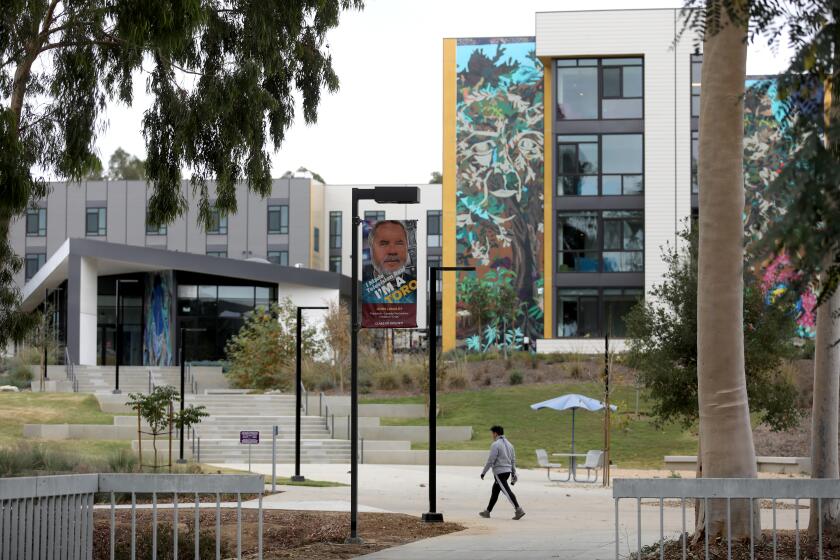
Many CSU students see big upsides to online learning. Now, there is a push to expand it
COVID-19 forced schools to shift to online learning. At CSU, it’s sticking around in what will be a new normal.
June 4, 2021
As an unintended consequence of technology allowing remote learning and exams, students are finding more and more online venues allowing them to earn grades and diplomas by cheating.
How do we curb this global supply chain of cheating and its threat to the integrity of our students and educational systems?
The answer depends on the motivation behind the decision to cheat. Some students don’t think of it as cheating, as they are paying a legit company for the service; many feel pressured to get the grades and so justify the means. Other students may use these services to make up for the learning lost when in-person teaching was halted during the pandemic.
Many students who are cheating dodge academic consequences, as there are few technology solutions to capture original answers provided by experts, and plagiarism-catching software can’t detect original work bought and paid for by these students.
However, in 2020, Australian lawmakers made it illegal to arrange or advertise for sale certain cheating services such as paid essay writing. Did it have an effect? According to Forbes contributing writer Derek Newton, many of the biggest and best-known essay mills are ending operations there. But even then, fear of getting caught is probably not enough motivation to stop all cheating students.
Another action that should be aimed at contract cheating companies is getting Visa and PayPal to stop acting as payment intermediaries for them. And professors and their universities could join the Pearson lawsuit, though that may be a step too far for most risk-averse institutions of higher education.
Countering this cheating requires a coordinated effort by educational institutions and their accreditors, with accreditation agencies possibly changing online professional entrance exams to prevent cheating. Fields such as engineering, science and nursing will lose in the long run if newly minted students cheat their way into the professions.
Indeed, our society loses the most from this cheating in plain sight. Cheating corrupts the individual who cheats, yes, but it also erodes the faith we have in our educational system, its honest graduates and the people we depend on to build tech that truly serves human interaction, decision making and achievement.
Karen Symms Gallagher is a professor of education and the Veronica and David Hagen chair in women’s leadership at USC. As dean of the USC Rossier School of Education, she was an early adopter a decade ago of online education for master’s degrees.
More to Read
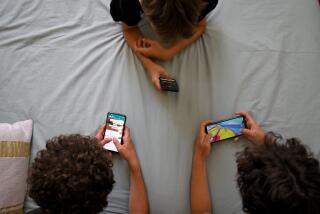
Letters to the Editor: Your teen’s phone and Cheetos addiction isn’t their school’s problem to fix
March 20, 2024
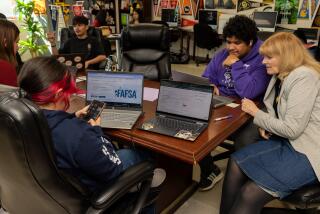
Opinion: The college tuition system is broken. FAFSA headaches are the latest proof
Feb. 23, 2024
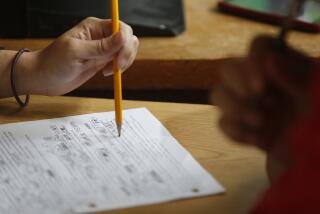
Opinion: The surprising way to help your brain remember
Feb. 19, 2024
A cure for the common opinion
Get thought-provoking perspectives with our weekly newsletter.
You may occasionally receive promotional content from the Los Angeles Times.
More From the Los Angeles Times

Litman: Did Stormy Daniels’ testimony help or hurt the case against Trump? It’s complicated

Opinion: Do campus protests show Americans’ support for Palestinians has reached a turning point?

Opinion: The ‘Man versus Bear’ TikTok meme went viral. Here’s another way to approach the question
May 8, 2024

Opinion: For the greats of the jazz age, life on the road was perilous as well as glamorous
Search Form Overlay
Search cta.org.
- Member Benefits
- Leader Resources
- Help Center
- 2024 NEA RA
- Facebook Link
- Twitter Link
- Instagram Link
- YouTube Link
- Click to print
- Share this page on Pintrest
- Share this page on Facebook
- Share this page on Twitter
- Comment on this article
September 28, 2020 Teaching & Learning
How to avoid online cheating & encourage learning instead.
Students tempted to find easy answers while distance learning
By Sherry Posnick-Goodwin
Joline Martinez suspected many of her students were cheating after her school closed last spring and she transitioned to distance learning. They showed their work on equations and came up with the correct answers, but something was definitely off, says the Yosemite High School math teacher.
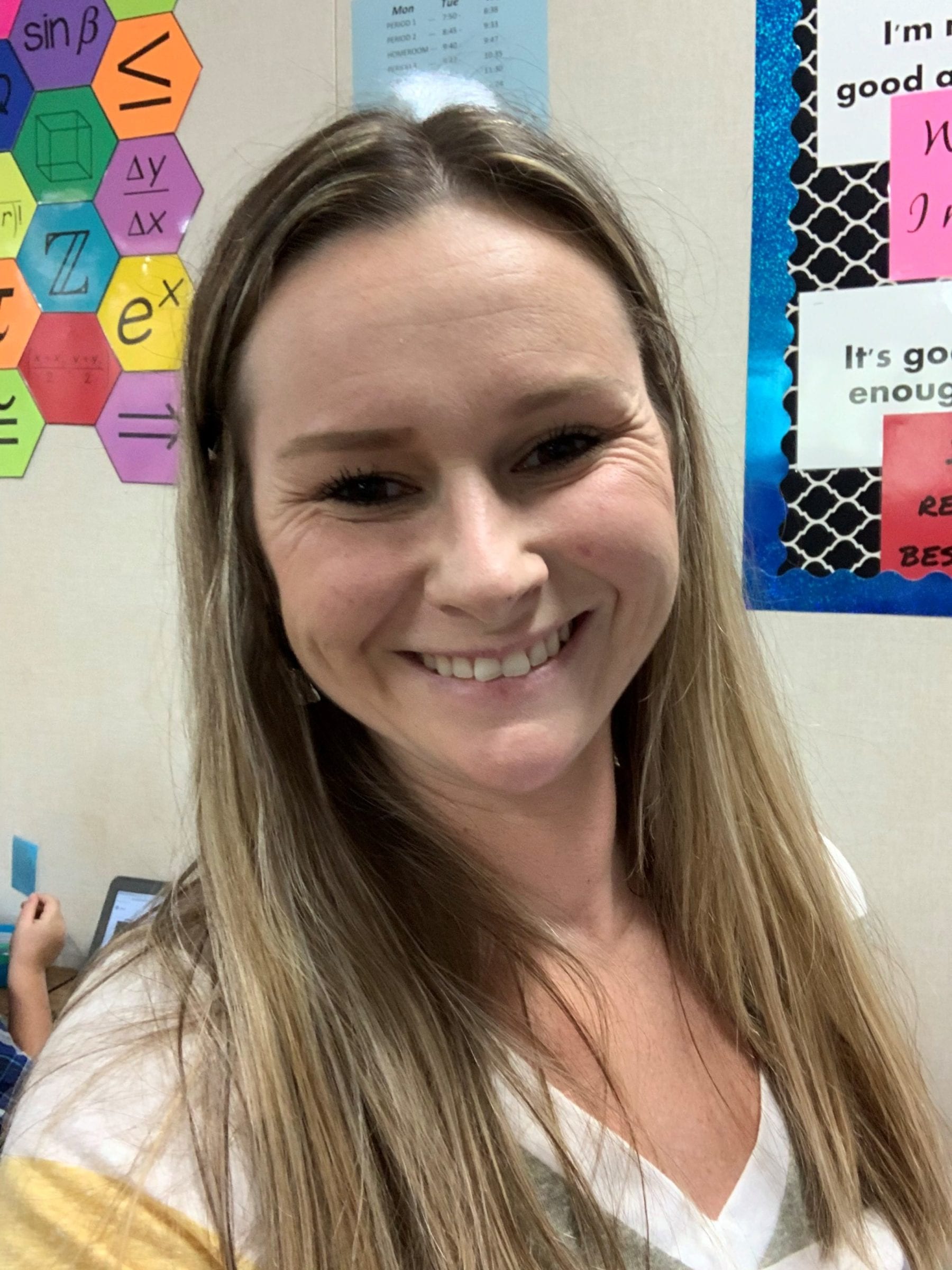
Joline Martinez
“My students were solving problems with ridiculous fractions,” says Martinez, a member of Yosemite Unified Teachers Association. “They were using steps they had never been taught. It was a huge issue. I suspected they were cheating. I was losing sleep over this.”
Martinez was so frustrated, she posted about it on CTA’s “Teaching, Learning and Life During COVID-19” Facebook page, and found she was not alone. Numerous CTA members responded to her post, saying they also suspected students were cheating while working from home.
One of them, Maggie Strode, was troubled that students who were struggling when attending school on campus were suddenly turning in perfect papers during distance learning.
“Students were combining several steps into one while solving equations, and always moved the variable to the left side of the equation,” says Strode, a math teacher at South Hills High School and member of the Covina Unified Education Association. “It’s something I do not have my students do, because when they are doing the equations on their own, it leads to errors.” During online office hours she asked them to solve similar problems, and they didn’t have a clue.
Both teachers figured out their students were using Photomath, an app that utilizes a cellphone’s camera to recognize mathematical equations and display a step-by-step solution onscreen — which may differ from how students were taught.
“It’s frustrating,” says Strode. “I was creating videos showing students how to do the work, but they weren’t watching them. Instead, they used this app. It’s much easier to keep an eye on students when you have them in your classroom. When they work from home, it is much more challenging.”
“I gave them the opportunity to resubmit. Students were going through a lot, and I wanted to demonstrate compassion.” — Karin Prasad, Liberty Education Association
Students are more tempted with distance learning
When schools closed abruptly last March due to COVID-19, older students knew that their grades couldn’t be lowered, only raised. Nonetheless, many cheated while working from home, even those with passing grades, say teachers.
Educators admit they were so overwhelmed with transitioning to distance learning that it was difficult to police students who were intent on beating the system. Students can Google answers instantly on their phones during exams and watch videos about how to cheat on YouTube. (Some colleges are having students install a second camera on their devices and clearing their workspace, so that instructors can see students’ hands during exam time.)

Karin Prasad
Distance learning has created more temptations for students, observes Karin Prasad, an English teacher at Heritage High School in Brentwood. She uses turnitin.com , an online program that compares her students’ work with other student essays in the system and also published work. After schools closed due to the pandemic, two essays were red-flagged in what’s called a “similarity report.”
Normally she would have given both students a zero on the assignment. But Prasad gave them some leeway because of the state of the world.
“Being in a pandemic is weird and scary,” says the Liberty Education Association member. “So instead of giving them a zero, which I would have done in a normal school year, I gave them the opportunity to resubmit. Students were going through a lot, and I wanted to demonstrate compassion.”
Martinez also didn’t make a big fuss the way she would have under normal circumstances. “I didn’t really push the issue. I didn’t want to have to contact all of the parents; I have 200 students in my classes. It was definitely an uphill battle.”
This year will be different, vows Martinez, whose district will begin the year online. Students will be held accountable for work done from home, and the no-cheating rule will be strictly enforced.
“I give timed quizzes, where they only have a short time for each question — and no time to look it up.” — Pedro Quintanilla, Imperial Valley Teachers Association
- How teachers can put the kibosh on cheating
“If you can Google the answer to a question, it’s not worth asking,” says Katie Hollman, a seventh grade math teacher at Walter Stiern Middle School in Bakersfield. “Students immediately jump on Google to hunt for answers in class by opening a second tab on their computer, so you can just imagine what happens at home on cellphones.”
Hollman, a member of the Bakersfield Elementary Teachers Association, asks students to explain their work on Flipgrid videos they create. She also has students create their own real-world math word problems, and then solve them. It might involve visiting a restaurant and explaining the bill, deciding how much they want to tip, adding the tax, and figuring out percentages, for example. Or going to various grocery stores and comparing the unit rates of various items for sale to discern which is a better bargain. Because students are mostly at home, the research for menu and grocery store items happens online, of course.

Pedro Quintanilla
Imperial High School teacher Pedro Quintanilla can tell if students are cheating on exams while solving math problems with paper and pencil, by looking at handwriting when assignments are submitted online. If the work seems too perfect, without pressure points in some spots and nothing crossed out or erased, he becomes suspicious.
“If you don’t see any struggle, that is a big sign,” says Quintanilla, an Imperial Valley Teachers Association member.
“One of the ways I assess knowledge of major concepts is by giving a timed quiz, and have them submit their answers to each question, one at a time, almost immediately. Also, I include a Quizzizz activity [a fast-paced, interactive game] where they need to perform the skills learned in a lesson. In addition, no pun intended, I have them submit their notes for a lesson. And I give timed quizzes, where they only have a short time for each question — and no time to look it up.”

Suzie Priebe
Suzie Priebe, a history teacher at Amelia Earhart Middle School, asks students to write about things they are knowledgeable about on the first day of class so she can hear their “voice” and get a “flavor” of how they write. She compares their tone to essay questions later, to determine authenticity.
She also asks them interpretive questions on history, such as “What do you think is the most important thing about the Bill of Rights and why?”
“In history, it’s not as important to memorize, because you look up things on Google, such as when the Declaration of Independence was signed. But knowing why it was signed and being able to explain that is just better.”
Other ideas to prevent cheating online:
- Mix it up , with tests having a variety of multiple-choice, true/false and open-ended questions. It’s more difficult for students to share answers when they must explain concepts.
- Have every student start the exam at the same time and set a time limit. The key is having enough time for students who know the information to respond, but not enough time for students who don’t know the material to search online for answers.
- Only show one question at a time , so students can’t be searching ahead on Google.
- Change test question sequence , so that all students do not have the same question at one time, to avoid screen sharing.
- Give students different versions of the same test to thwart screen sharing.
- Give students their scores all at the same time , so that students who finish early don’t confirm answers for those still working.
- Increase points for class participation .
- Talk about integrity , and have students sign an “academic integrity” agreement.
“I want my students to be successful. If they rely on shortcuts and cheat, they won’t survive in the real world.” —Maggie Strode, Covina Unified Education Association
Encourage students to be honest
Talking to students about integrity, trust and doing the right thing also prevents cheating.

Maggie Strode
“I let my students know that once you are labeled a cheat, it’s very hard to regain trust,” says Strode. “I tell students I’d rather they not turn in an assignment than turn in work they didn’t do. They don’t realize that they sometimes put more time and effort into cheating than it would take to just do the assignment. I love my students. I want them to be successful — not only in my classroom, but in life. If they rely on shortcuts and cheat, they won’t survive in the real world. No one will make allowances for them there.”
Hollman discusses cheating in her weekly “Life Lessons with Hollman” sessions, urging students to resist the temptation and instead ask for help.

Katie Hollman
“I want to help them understand the material so we can fix the problem. I make time for tutoring during online office hours. And I explain that if they cheat in college, they won’t just get a zero on an assignment — they will get kicked out of school.”
She also explains that it’s in their own best interest: If enough students cheat, the teacher assumes the class has mastered the material, and makes the curriculum even more challenging.
Quintanilla talks to his students about the importance of digital citizenship and the value of the honor system in his classes.
“With distance learning, you have to establish a good relationship with students, and then, when you emphasize honesty, you have more buy-in from them.”
“I would rather see the child attempt something, fail, and ask for help, rather than not try.”
Distance Learning: Parents Doing Children’s Work?
Even in normal times, second grade teacher Nailah Legohn has seen the lines blur between parental support and parents doing the homework, so their children don’t fall behind. But with distance learning, parents and sometimes older siblings are doing schoolwork of children more frequently.

Nailah Legohn
“Sometimes it’s hard to know who is really doing the work,” says Legohn, a teacher at Ridgemoor Elementary School in Sun City. “The little ones need a lot of parent support. And they may be saying, ‘I don’t get it.’ If they whine and cry enough, the parent may give in and provide the answer because they want the child to get credit — or they want their child to go outside and play. Parents are under so much pressure. Many of them are also working at home while trying to help their children.”
Parents think they are helping, but they are not, says Legohn, a member of the Menifee Teachers Association. “I tell them, ‘Please don’t do the work for them.’ I explain that they are not setting up their child for success. If kids know that someone else is going to provide the answer, they will expect that to happen when they go back into the regular classroom. And that’s not how it’s going to be. When schools reopen, students are going to have to do the work themselves. If they aren’t used to it, it will be much more of a struggle.”
Legohn asks her students to circle problems that are difficult for them, and then she helps students understand the material by offering extra help during virtual office hours. They can also message her on Google Classroom to ask questions.
“I want my students to love learning and understand how to learn,” says Legohn. “I am pushing for them to have a growth mindset and the ability to ask questions. I would rather see the child attempt something, fail, and ask for help, rather than not try. Parents are role models, and the best way they can help is teaching their children to take responsibility for their own learning.”
#online learning
You might also like:, advocating for transparency, accountability and equal access.
May 1, 2017
Follow the Money
Celerity: the opposite of austerity, livermore: a cautionary tale, in this story.
- Ideas to prevent cheating online
- Sidebar: Parents Doing Children's Work?
Stay Informed
Stay up-to-date with all the latest california teachers news, events, and member benefits..
- Name * First Name Last Name
We appreciate your interest in California Teachers Association. Our Privacy Policy explains how information is collected, used and disclosed by CTA.
By providing your phone number, you agree to receive text messages from California Teachers Association. Message and data rates may apply. Message frequency varies.
How to Prevent Student Cheating During Remote Learning: 4 Tips

- Share article
The student had perfect scores on the first two tests in Michele Kerr’s math class, offered virtually this summer because of the coronavirus. But, in just a few minutes of one-on-one conversation during her online office hours, Kerr noticed he struggled to grasp the material.
Kerr quickly figured out what was going on. “You cheated” on those tests, she told the student. He admitted she was right.
Kerr, who teaches math and engineering in California’s Fremont Unified School District, is always on the lookout for academic dishonesty. But she and her colleagues across the country are on heightened alert now that the coronavirus has forced thousands of schools to offer more virtual learning experiences than ever before.
“I expect cheating to go up in this new environment and I expect that it will have negative effects long term on how much students learn in their classes,” said Arnold Glass, a professor of psychology at Rutgers University who has done research on the impact cheating has on learning.
Already, some teachers have reported that grades were higher this spring, when many schools went online only, and wondered if cheating could be at least partly the reason.
Here are 4 tips for discouraging and preventing student cheating:
Tip #1: Emphasize Critical Thinking and Inquiry
A big part of the solution, educators and experts say: Give assessments and assignments that require students to analyze information, craft creative presentations, or explain their thinking.
“If you are developing critical thinking and inquiry-based activities that frankly require kids to think and apply their learning, you’re not going to have cheating, because you can’t cheat on that, you really can’t,” said Michelle Pearson, who teaches social studies at Century Middle School in the Adams 12 school district in Thornton, Colo.
On the other hand, answers that can be easily found on a cellphone, for assignments like “multiple choice and fill in the blank stuff, [that’s] not necessarily higher-level thinking that should be in a final assessment,” she said.
It’s possible to offer creative, cheating-proof lessons even in a remote learning environment, Pearson said. For instance, last spring, when her district shifted to all-virtual schooling, she asked students to research one of nearly 300 historical sites and create a presentation explaining its significance to westward expansion.

Tip #2: Create a Classroom Culture That Discourages Cheating
Some educators are trying to create a classroom culture that discourages cheating and dishonesty, even if it’s in an online environment.
Teachers at Oriole Park Elementary School in Chicago have been trying to help students understand that assignments and tests are about figuring how best to help them learn. That means starting the school year talking “less about grades, and more about: we want to know how you can get the most out of your education here,” said Emily Hogan, who teaches 1st grade.
Hogan’s colleagues have also brainstormed creating an “honor code” for their classes that focuses on academic honesty.
“We are talking about character and what character is comprised of and how they can be a good person when nobody is watching,” she said. Such conversations are necessary because it would be impossible to cut off all avenues to cheating. “There’s no way we can micro-manage them,” Hogan said.
That approach can work for older students, too.
Kristin Record, who teaches physics at Bunnell High School in Stratford, Conn., plans to address the cheating issue more directly than in the past.
“My plan is to be a little more overt” than usual, she said, given how easy it is to cheat in a virtual environment. She’ll tell students, “Let’s be real with each other now, obviously you can take a picture of your work and text it to your friend. What do you gain by doing this? What do you lose by doing this? What’s your motivation for doing it?”
Students in Record’s class can receive college credit for their work, either through Advanced Placement or a dual enrollment agreement with the University of Connecticut. She’ll remind them that the consequences for cheating in high school—say, getting a zero on an assignment—pale in comparison to the consequences of cheating in college, where students can be suspended or expelled from school.
Tip #3: Use Peer Feedback, Daily Assignments
Allowing students to assess each other’s work is another good way to cut down on cheating, said Pearson, the Colorado teacher. That’s something that’s a hallmark of her classroom, both in person and now online.
“I work diligently to really create a community network of peer feedback, where kids are giving direct feedback to each other, they are critically thinking about what their partners are writing,” she said. “When you have peers evaluate peers, it reduces [cheating] tremendously because they are held accountable to their buddies.”
Kerr also recommends getting a good sense of what students know by asking them to turn in their classwork daily. That wasn’t as necessary when her district went all-remote in the spring. “I knew my kids and could tell who was cheating,” she said. But it will help when she has a new crop of students.
Tip #4: Have Students Turn on Their Computer Cameras
Technology tools can also help cut down on the temptation to cheat.
For instance, Kerr requires her students to turn their computer cameras on during tests and quizzes. And she disables the “chat” function in Zoom so that the class can only communicate with her, not each other.
Jacob Ryckman, who teaches English and English as a Second Language in the Plano Independent School District in northwest Texas, says some of his colleagues use software, available on Google’s Chromebook, that allows teachers to get a glimpse of their students’ computer monitors.
Google classroom lets teachers create a quiz or assignment that must be completed in a certain time frame. And it permits teachers to change settings so that students can’t open any other windows, making it tougher for kids to pull off a quick search.
But, of course, students could still look things up on their phones or other devices.
“Especially when kids are working remotely, there’s no 100 percent fail-safe [strategy],” Ryckman said.
A version of this article appeared in the September 09, 2020 edition of Education Week as How to Prevent Student Cheating During Remote Learning: 4 Tips
Sign Up for EdWeek Update
Edweek top school jobs.

Sign Up & Sign In

Academic Dishonesty: 5 Methods of Identifying Cheating and Plagiarism
One aspect of teaching that can make an instructor feel pessimistic and disheartening is when a student attempts to gain an unfair advantage. Most of the time, this is labeled simply as cheating , defined as intentionally using or attempting to use unauthorized materials on any academic exercise , or plagiarism , the appropriation or use of another person's ideas, results, or words without giving appropriate credit , but we see instances of fabrication and other acts of dishonesty. What can you do to combat acts of academic dishonesty? This article is meant to help faculty members at any level, even teaching assistants, identify possible occurrences of academic dishonesty.
Know Your School’s Policies & Be Transparent with Your Students
When you become a faculty member at a new institution, take a more extensive teaching role at your current institution, or even a long-time teacher implementing new curriculum changes, you must identify and know the school’s policy and rules regarding academic honesty and creating a fair classroom environment. Each faculty member may enforce the rules differently, but it’s critical that the students know your classroom rules and expectations upfront. A few key items to consider:
- Do you want them to work with other students on their homework?
- What rules and procedures do you have for assignments, reports, and exams?
- Put this information in your syllabus and discuss this with them on Day 1 of your course with transparency.
If one of your students performs an act of academic dishonesty in your course, this will allow you to enforce the sanctions professionally. If you don’t know where to find this information, ask your faculty mentor or your university’s appropriate administrative office. These offices are usually the academic honor office, the department or college office, or the Dean of Faculties office, depending on the institution.
2. Watch for the Methods Students Use to Cheat and Plagiarize
The reasons why students cheat have not changed, but how students cheat has changed dramatically. Typically, there is an assumption that most cheaters are bad or failing students, but students cheat for a multitude of reasons: poor time management skills, a tough class schedule, stress, and anxiety, or poor communication of the rules by their faculty members. The use of social media and other electronic resources has changed academia over the last 20 years. A few examples of some cheating methods to watch out for include:
- Social Media Communication: Students discuss test questions and individual assignments via social media and other chat apps to give their friends and colleagues academic advantages.
- Smartphones: Many students take pictures of their answers with their smartphones and send them to others using text messages.
- Smartwatches: Recently, smartwatches have become more prevalent and allow communication and internet browsing without the use of a cell phone. They allow students to access study files and answers that were not authorized by the faculty member.
- Groups that Share Tests: Many student organizations have tests and assignments from previous semesters that allow students to look up questions from a faculty member or specific class.
- Unauthorized Help: Tutoring services will discuss how to “beat a test” or “write the perfect paper” by giving students unauthorized aid. This can also include groups or individuals who may offer to write a paper or take a test for a fee on behalf of the student.
Being smart as a faculty member is knowing that these outside resources are available and to identify when they are being used improperly.
3. Be Proactive, Not Just Reactive
For some instances of academic dishonesty, the origin of the problem comes back to the faculty member not taking a proactive role in combating the acts.
- Full Established Boundaries: The first place for immediate improvement is the discussion of unacceptable acts on the first day of class and syllabus. Many faculty members will only include the minimum required statement in their syllabus. This does not properly set student academic honesty boundaries. Establishing such boundaries might be informing students of the use of plagiarism detection software, describing acceptable behavior and communication about assignments on social media, or acceptable help on homework, essays, and reports.
- Variety in Assessment: Another place where faculty can improve is writing different assignments or multiple forms for exams. Changing up how you ask questions, what essay question prompts you to use, and creating different forms for exams can be time-consuming. However, this effort will reward students with a fair and objective assessment. If you are concerned with academic dishonesty in your course, putting in some work early will benefit your course in the long run.
4. Grade Assignments, Reports, and Essays Attentively
Most of the time, trust your own feelings when looking for possible occurrences of academic dishonesty. When grading assignments, if the work seems more advanced than the student’s level or that they do not seem to follow the question prompt, this can be a strong indication of plagiarism. A few ways to validate these concerns and provide either “proof” or deterrents of this behavior include:
- Show Your Work: Require multiple drafts of a paper and give feedback regarding citation standards throughout the writing process.
- Side-by-Side Grading: If you have research papers or lab reports in which students worked with a partner or in a group, grade the assignments side-by-side. While the data or general content may be the same, direct copying will be more apparent.
- Online Plagiarism Checkers: Technology has been developed to help identify plagiarism. Websites such as Turnitin.com , Unicheck , PlagarismSearch , and others have students upload their essays/reports then compare all submissions to other online resources and papers turned in for other courses or at other institutions. Many schools have licenses for this technology and you should utilize it on any type of critical thinking or writing assignment.
5. Manage Exam Administration and Proctoring
Most attention is focused on deterring cheating is during exams. A few methods that can specifically help discourage academic dishonesty during these high-stake assessments include:
Assigned Seats: A good first step is to assign seats for each exam. While this might be challenging for a large lecture hall, it minimizes the chance of friends and study partners sitting next to each other; thereby limiting the student interaction. It also allows faculty or proctors to know who is present to take the exam.
- Variety & Alterations by Section: As mentioned before, having multiple forms of an exam can be a great preventive for cheating. Having different exam forms with the same questions mixed in a different order, or similar questions about the same are all small, minor changes that can promote an honest testing environment.
One topic of test administration that does not get enough attention is proctoring. In a small classroom, there may be only one adult in a 20-40 student class. For larger lectures containing 200-400 students, teaching assistants help faculty make sure students are taking their exams honestly. How can proctors create an honest environment?
- They must proctor actively: Many proctors distribute exams and then ignore the students to grade other assignments, work on their computers, look at their cell phone or possibly leave the room. After you pass out the exams, you should walk around, checking for anything suspicious, and watching for students looking at other exams. If you spot any of these behaviors, make an immediate change.
- Reminders About the Rules: Announcements about looking at their own paper can only help so much, so moving students to correct behavior might be necessary. Having another set of eyes and having another presence in the room, even for a brief time, can correct behavior.
- Instructor Collaboration: Faculty members that do have test proctors should meet with them before the exam, explain to them the correct protocols, and describe past experiences or issues that occur during exams. This five-minute discussion will help a test proctor during a situation they have never faced and keep them actively involved during the exam session.
While cheating and plagiarism can cause many faculty members to become frustrated, being able to give your students a fair testing environments and objective assignment is the goal of all successful educators.
Attending a conference?
Checkout if mcgraw hill will be in attendance:.
Marathon winner disqualified after taking water from his dad in race: 'I know I won'
Prado knew that he had access to aid stations but was unaware of this rule.
Esteban Prado, a 24-year-old long distance runner, led for almost all of the 2 hours, 24 minutes and 54 seconds that he was on the 26.2 mile course of the Orange County Marathon in southern California on Saturday.
But the celebration for the Fountain Valley, California, man was short-lived when he found out that he had been disqualified from the race entirely for taking water from a family member during the race, according to ABC News’ Los Angeles station KABC .
MORE: Ultra-marathon runner disqualified after allegedly cheating by using car in race
The issue wasn’t the fact that he was drinking the water but rather when he accepted it.
"During yesterday’s Hoag OC Marathon, we were forced to disqualify a participant after it was confirmed they received unauthorized assistance from an individual on a bicycle, in violation of USA Track & Field rules and our race regulations,” said Race Director Gary Kutschar in a statement obtained by ABC News. “We take these rules seriously to ensure fairness and the integrity of our event for all competitors.”
MORE: US swimmer rescued by coach from bottom of pool after fainting in World Championship
According to the rules, runners can only get water from official hydration stations and since he received water at an unauthorized part of the race, he was disqualified.
“I know I won," Prado said in disbelief, according to KABC .
MORE: Former NBA great Shawn Kemp arrested on felony drive-by shooting charges
MORE: Man injured after kicking bison in the leg while under influence of alcohol at Yellowstone
In only his second marathon, the runner said he spent about four months training for the marathon and was enjoying the spoils of victory when before he received a call from the race director, saying a competitor saw him get a water bottle during the race, KABC said.
"The only person that could see me within range was second place," Prado told KABC . "Whenever I got to these stations, the volunteers were scrambling because I'm the only runner in sight," he said. "You could barely see me, like, at certain turns."
MORE: 2-year-old boy dies after bounce house carried away by wind gusts
Prado knew that he had access to aid stations during his run but was unaware of the rule, specifically Rule 144 of the USA Track & Field competition rules, that taking any provisions outside of those areas is considered “assistance.”
Prado was not happy with the outcome.
MORE: Climber dead, another seriously injured after 1,000-foot fall off Alaska mountain
"You get no money or anything,” Prado told KABC. “You know, if [the second-place runner] wanted that congratulations for that first place, if he really felt like he needed it, it's just for him at the end of the day," said Prado. "I really got nothing out of it. I know I won."
Prado won't be able to use his final race time to qualify for future races.
MORE: Series of bomb threats targeting LGBTQ+ Pride events in Montana deemed to be hoaxes
But, at least for now, Prado says he may run his third marathon in the fall and plans to follow all the rules.
The race, which also served as the national championship for the Road Runners Club of America -- the nation's oldest and largest distance running organization -- was officially won by Jason Yang of San Pedro, California, who was declared the winner in 2 hours, 25 minutes, 11 seconds after Prado’s disqualification.
Top Stories

Trump seeking to fast-track challenge to gag order in his hush money trial
- 32 minutes ago

Georgia court takes up Trump appeal of Willis ruling, possibly delaying election case
- May 8, 10:51 AM

Man trying to spread HIV through sex with men and teenage boys sentenced to 30 years
- May 8, 4:30 AM

Robert Ray on Trump and hush money trial details
- May 7, 12:17 PM

Marathon winner disqualified after taking water from his dad in race: 'I know I won'
- May 8, 3:26 AM
ABC News Live
24/7 coverage of breaking news and live events

COMMENTS
This study investigated cheating behaviours, contributing factors, and strategies to enhance the integrity of assessment in an online learning context. The researchers conducted an analysis of the literature on students' motivation to cheat in online modules and noted that there is limited research on the specific reasons why students cheat in online learning contexts. To contribute to this ...
Today, distance education has been transformed into online settings, and the COVID-19 pandemic has raised online learning significantly across the world. ... To detect plagiarism in papers or essay-type questions, ... During an online exam, multiple-choice questions are highly susceptible to cheating. Hence, long essay questions are preferred ...
Distance learning came to the fore during the global COVID-19 pandemic. Distance learning, also referred to as e-learning, blended learning or mobile learning (Zarzycka et al., 2021) is defined as learning with the use of technology where there is a physical separation of students from the teachers during the active learning process, instruction and examination (Armstrong-Mensah et al., 2020).
Keywords: academic dishonesty, cheating, online education, distance education, plagiarism 1. Introduction Academic dishonesty in higher education has been a topic of concern for many decades. An abundance of research has been conducted that considers various forms of cheating, reasons for cheating, and ways to prevent it.
Introduction. Online education and evaluation have grown more common as a result of COVID-19. For the vast majority of online transfers, there is little time to ensure academic integrity (Zhao et al., 2022).Exams and papers are two of the most prevalent ways of evaluating students' abilities (Comas-Forgas et al., 2021).The outcomes of these exams may have a significant impact on students ...
The current study is a review of 58 publications about online cheating, published from January 2010 to February 2021. ... During an online exam, multiple-choice questions are highly susceptible to cheating. Hence, long essay questions are preferred ... Online Journal of Distance Learning Administration, 13(1).
Cheating, learner perceptions, online distance learning, virtual/online classes, online exams. INTRODUCTION . Online learning, as a form of distance education, is any learning experience or environment which depends on the Internet as the main delivery mode of communication and presentation (Appana, 2008). Via online
This study aimed at highlighting the Turkish higher education learners' perceptions of cheating on online learning programs, the ways of, causes for, and some suggestions to minimize cheating ...
Data show the rate of cheating on tests is on the upswing. A student takes an online exam for a business course. One online proctoring company has provided figures showing a dramatic increase in cheating since education went online because of the coronavirus. Credit: Katie Falkenberg/Los Angeles Times via Getty Images.
Companies such as Grade Bees and EduBirdie will even write your five-page reflective paper or 25-page essay, as original work, for varied prices. English-speaking writers from around the world are ...
Review of literature. Academic dishonesty is a complicated system including a variety of components that interact in unanticipated ways. Due to the vast number of paper mills, full-text databases, and collaborative web pages, many researchers attribute the rise in academic dishonesty to the increased usage of the internet, which generates "opportunities" for cheating (Peytcheva-Forsyth, et ...
cheating as new normal: senior high school students' views on academic integrity before and during the distance learning
A systematic review of research on cheating in online exams from 2010 to 2021 Fakhroddin Noorbehbahani1 · Azadeh Mohammadi1 · Mohammad Aminazadeh1 Received: 26 October 2021 / Accepted: 31 January 2022 / Published online: 7 March 2022 ... Today, distance education has been transformed into online settings, and the COVID-19 pandemic has raised ...
ProctorU. This service provides online proctoring during exams to help detect and prevent cheating and ensure students take the tests themselves. SafeAssign. Teachers can upload student papers to SafeAssign, which then compares it against other papers to check for overlap and originality. BioSig ID.
Distance learning has created more temptations for students, observes Karin Prasad, an English teacher at Heritage High School in Brentwood. She uses turnitin.com, an online program that compares her students' work with other student essays in the system and also published work.After schools closed due to the pandemic, two essays were red-flagged in what's called a "similarity report."
The purpose of this study is (1) to investigate why students cheat in their online assessments, (2) to explore the contributing factors of cheating behaviours, and (3) to determine strategies to ...
Online educators are trying to keep the virtual programs transparent. Maintaining the ethical code of conduct is of paramount importance in the field of education. However, online assignments and examinations pose a severe challenge. Cheating is not uncommon among students within primary education and higher education levels.
Tip #4: Have Students Turn on Their Computer Cameras. Technology tools can also help cut down on the temptation to cheat. For instance, Kerr requires her students to turn their computer cameras on ...
5. Manage Exam Administration and Proctoring. Most attention is focused on deterring cheating is during exams. A few methods that can specifically help discourage academic dishonesty during these high-stake assessments include: Assigned Seats: A good first step is to assign seats for each exam.
Designing Out Cheating. In respect of online and distance institutions the QAA noted that: 'Establishing authorship and authenticity of work is difficult enough for campus-based students, but there is an additional burden on an institution that offers distance learning/online programmes with no attendance requirements. It guides that ...
The program costs $12 per month with no minimum contract. Turnitin. Developed especially for university students, Turnitin offers a great and easy way to ensure you don't plagiarize another's work. The app provides a score based on how much overlap text is found in your document, and it is currently free for students.
nology has accelerated cheating in traditional assessment contexts. Online assessment is not immune to cheating, and this remains a significant issue (Arnold, 2016; Stevens et al., 2022; Oravec, 2022; Valızadeh, 2022), with some arguing that online education makes cheating more difficult to detect (Stevens et al., 2022).
While the Swiss-based IB did not reply to a question on the number of students found cheating, the Post found the leaked materials had been downloaded more than 47,000 times as of Monday afternoon.
Table 1 shows that 60% (n=34) of the participants answered that students sometimes tend to cheat in distance. learning, while 52.7% (n=30) consi dered cheating in distance le arning programmes ...
Jason Prado, a 24-year-old long distance runner, led for almost all of the 2 hours, 24 minutes and 54 seconds that he was on the 26.2 mile course of the Orange County Marathon in southern ...